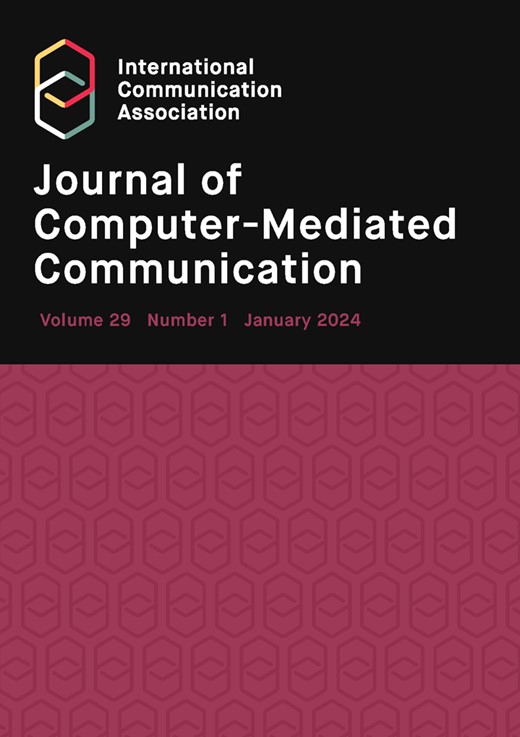人际工作对话中视频聊天中的自视效果
IF 5.7
1区 文学
Q1 COMMUNICATION
引用次数: 2
摘要
随着视频聊天在日常生活中的使用越来越多,了解视觉沟通渠道如何影响人际关系变得至关重要。将视频聊天与面对面交流区别开来的一个潜在的重要特征是,交流者能够在互动过程中看到自己。我们的目的是确定自我审视对工作场所对抗过程和结果的影响。采用多仪器(自我报告、生理唤醒、眼动追踪)进行两种(自我观察与无自我观察)条件下的二元实验。结果表明,自我审视降低了自我评价,进而降低了解决方案满意度。自我审视也会削弱一个人评估伴侣态度的能力,降低对伴侣的评价。虽然自我审视减少了消极情绪表达,但对谈话语气的影响取决于个人扮演的角色。自我观察能力的整体负面影响对适当实施计算机媒介渠道以增强一个人在进行困难对话时的体验具有重要意义。本文章由计算机程序翻译,如有差异,请以英文原文为准。
The effects of self-viewing in video chat during interpersonal work conversations
With the growing use of video chat in daily life, it is critical to understand how visual communication channels affect interpersonal relationships. A potentially important feature that distinguishes video chats from face-to-face interactions is the communicators’ ability to see themselves during the interaction. Our purpose was to determine the effects of self-viewing on the process and outcome of a workplace confrontation. A dyadic experiment with two (self-viewing vs. no self-viewing) conditions was conducted using multi-instruments (self-report, physiological arousal, eye-tracking). Results showed that self-viewing reduced self-evaluation, which subsequently reduced solution satisfaction. Self-viewing also impaired one’s ability to assess their partner’s attitude and lowered partner evaluation. Although self-viewing decreased negative emotional expressions, the effect on conversation tone varied depending on the role an individual played. The overall negative impacts of self-viewing ability have significant implications for the appropriate implementation of a computer-mediated channel for enhancing one’s experience when having a difficult conversation.
求助全文
通过发布文献求助,成功后即可免费获取论文全文。
去求助
来源期刊
CiteScore
9.60
自引率
2.80%
发文量
26
期刊介绍:
The Journal of Computer-Mediated Communication (JCMC) has been a longstanding contributor to the field of computer-mediated communication research. Since its inception in 1995, it has been a pioneer in web-based, peer-reviewed scholarly publications. JCMC encourages interdisciplinary research, welcoming contributions from various disciplines, such as communication, business, education, political science, sociology, psychology, media studies, and information science. The journal's commitment to open access and high-quality standards has solidified its status as a reputable source for scholars exploring the dynamics of communication in the digital age.

 求助内容:
求助内容: 应助结果提醒方式:
应助结果提醒方式:


